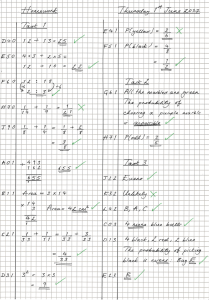At Orchard Mead Academy we believe that homework is an important way to consolidate what we have learnt during the school day. Our homework is rooted in educational research, and we strive to ensure that our actions are based on the latest, relevant research to support learning. According to the Education Endowment Foundation (EEF) the regularly setting of appropriately challenging and well considered homework can add up to five additional month’s progress per academic year.
The purpose of homework at Orchard Mead Academy is to support the work being done in lessons and to enhance pupils’ understanding of key aspects of the subjects we teach. We value our subject experts and so subject leaders strive to create homework that is relevant to their curriculum and supports the specific knowledge and skills of each subject discipline.
How is homework set?
At GCSE your child’s homework is determined by the subject leader of the subjects they have continued to study. Most subjects set weekly homework.
Subject specific homework guidance can be found below:
Maths
Sparx Maths is used for Maths homework.
Sparx Maths – FAQs for Parents
Why does my child need to achieve 100% on their homework?
Sparx Homework is deliberately designed to help pupils really get to grips with and understand the concepts and skills they are learning by ensuring they cover the essential building blocks needed to make progress in maths. It is tailored to your child’s ability level (although initially this may take a few weeks) and your child’s personal strengths and weaknesses making it achievable for all pupils. It is advised that pupils do their homework as early as possible, so they have the time to try themselves and seek help from their teacher if needed.
How long will my child need to complete their homework?
Each student should spend roughly an hour per week completing their Sparx homework. This may vary a little depending on how easy they find that week’s topics. It can be done in one go or in small chunks but early completion is always recommended so they can get help from the teacher before the deadline if needed.
The odd long homework is nothing to worry about and future homework lengths will adapt, but if you notice that your child is regularly spending longer than 60 minutes on their compulsory homework, check that your child is writing their answers in their book and is not distracted by anything else while doing their work.
Why does bookwork matter?
There are clear benefits of recording your written workings in Maths:
- Research shows that writing down workings aids mathematical retention
- It helps students to prepare for written exams
- Writing workings as well as just inputting answers helps teachers identify mistakes and misconceptions
Sparx has bookwork checks built in to help students develop these good habits. Completing bookwork checks means homework is finished more quickly. Bookwork checks will be done more frequently for students who don’t pass them: ‘The more you pass, the less they’ll ask’!
What does good bookwork look like?
Generally we would want to see students do the following:
- Dateeach homework assignment at the top of the page
- Draw one or two marginson each page to write the bookwork code in
- Write each set of workings alongside the relevant bookwork code
- Ensure answers are ticked or crossed as they are completed
See below for an example of what good bookwork should look like:

How much help should I give my child?
Parental support is fantastic, but over-helping or doing the work for your child could lead to Sparx misunderstanding their level and making their homework too difficult. You should encourage your child to:
- Have a go at the question before seeking help
- Watch the videos when they get stuck
How do I know that Sparx is effective?
See below for a link to Sparx’s impact research that was evaluated and validated by Cambridge University and RAND Europe
MFL
Excellent study habits are cultivated through regular vocabulary tests (fortnightly in Y7 and Y8 in 2022-23 and weekly in Y9, 10 &11, and weekly for all from 2023-24) that students are asked to revise for at home (short revision sessions of 5-15 minutes over several days is recommended) so they can achieve or exceed their personalised vocab test target score, which is established by a combination of pupil performance in practice tests in lessons and teacher assessment. The vocabulary tests are designed to be accessible to all students and the first eight items in passive tests are a match up activity requiring only recognition, with the remaining items to be translated from French or Spanish into English, while in active tests the initial letter of each word is provided for the first eight items.
Our homework expectation is that all students work hard to commit this vocabulary to long term memory by using Quizlet or paper. We ask all students to either submit a screen shot of their Quizlet homework with the date on Satchel One or to bring in paper evidence of self-quizzing (look/cover/write/check) and give it to their teacher on the day of the vocab test. If at that point, any students have not submitted electronically or brought in paper evidence, they will receive a negative point, which could lead to a detention, as per our school homework policy.
KS4 students are also required to complete one page of a Reading/Translation/Grammar booklet to practise their exam skills and bring this to class on the day of the vocab test, or if they misplace the booklet to write their answers on paper and bring this instead.
Satchel FAQ’s
Homework Frequently Asked Questions:
- What should I do if I cannot log into Satchel for the first time?
If you are a parent or carer and have not logged into Satchel before, please use your unique parent login code. This has been shared with your child during tutor time at the start of the year. If you do not have this, please contact the school office to be given your unique code. - What if I cannot log into Satchel, but I have logged in before?
If you have forgotten your password, you can reset it through the Satchel website. - My child cannot access Satchel; what should I do?
Your child needs to log in using the Office 365 section with their school login credentials.
If they confirm they are doing this but still cannot access the account, please have them visit Mrs. Harley during tutor time (except Fridays) for assistance. If they do not know their school login, they should contact the IT support team or ask their Computer Science teacher in their next lesson.

 Together We Can Make a Positive Difference
Together We Can Make a Positive Difference